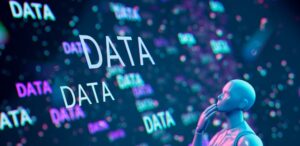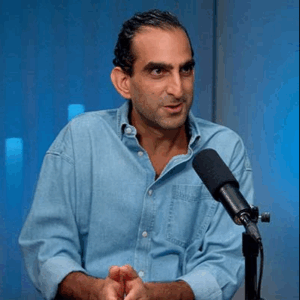
(Jirsak/Shutterstock)
AI progress is usually measured by scale. Larger fashions, extra knowledge, extra computing muscle. Each soar ahead appeared to show the identical level: in the event you might throw extra at it, the outcomes would observe. For years, that equation held up, and every new dataset unlocked one other degree of AI skill. Nonetheless, now there are indicators that the method is beginning to crack. Even the biggest labs, with all of the funds and infrastructure to spare, are quietly asking a brand new query. The place does the following spherical of really helpful coaching knowledge come from?
That’s the concern Goldman Sachs chief knowledge officer Neema Raphael raised in a latest podcast: AI Exchanged: The Position of Information, the place he mentioned the difficulty with George Lee, co-head of the Goldman Sachs International Institute, and Allison Nathan, a senior strategist in Goldman Sachs Analysis. “We’ve already run out of knowledge,” he stated.
What he meant shouldn’t be that info has vanished, however that the web’s greatest knowledge has already been scraped and consumed, leaving fashions to feed more and more on artificial output, and this shift might outline the following section of AI.
In accordance with Raphael, the following section of AI might be pushed by the deep shops of proprietary knowledge which can be nonetheless ready to be organized and put to work. For him, the gold rush shouldn’t be over. It’s merely transferring to a brand new frontier.
To know the crucial position of knowledge in GenAI, we should do not forget that a mannequin can solely carry out in addition to the fabric it learns from, and the freshness and vary of that materials form its outcomes. Early positive factors got here from scraping the open internet, pulling structured details from Wikipedia, conversations from Reddit, and code from GitHub.
These sources gave fashions sufficient breadth to maneuver from slender instruments into methods that might write, translate, and even generate software program. Nonetheless, after years of harvesting, that stockpile is basically spent. The provision that after powered the leap in GenAI is not increasing quick sufficient to maintain the identical tempo of progress.
Raphael pointed to China’s DeepSeek for example. Observers have recommended that one purpose it might have been developed at comparatively low value is that it drew closely on the outcomes of earlier fashions relatively than relying solely on new knowledge. He stated the vital query now could be how a lot of the following technology of AI might be formed by materials that earlier methods have already produced.
With essentially the most helpful elements of the online already harvested, many builders are actually leaning on artificial knowledge within the type of machine generated textual content, photographs, and code. Raphael described its progress as explosive, noting that computer systems can generate virtually limitless coaching materials.
That abundance might assist prolong progress, however he questioned how a lot of it’s really useful. The road between helpful info and filler is skinny, and he warned that it might result in a artistic plateau. In his view, artificial knowledge can play a job in supporting AI, but it surely can not substitute the originality and depth that come solely from human-created sources.
Raphael shouldn’t be the one one elevating the alarm. Many within the discipline now discuss “peak knowledge,” the purpose at which the perfect of the online has already been used up. Since ChatGPT first took off three years in the past, that warning has grown louder.
In December final 12 months, OpenAI cofounder Ilya Sutskever informed a convention viewers that just about all the helpful materials on-line had been consumed by present fashions. “Information is the fossil gas of A.I.,” stated Sutskever whereas talking on the Convention on Neural Data Processing Methods (NeurIPS) in Vancouver.
Sutskever stated the quick tempo of AI progress “will unquestionably finish” as soon as that supply is gone. Raphael shared the identical concern however argued that the reply might lie to find and making ready new swimming pools of knowledge that stay untapped.
The info squeeze is not only a technical problem; it has main financial penalties. Coaching the biggest methods already runs into lots of of thousands and thousands of {dollars}, and the fee will rise additional as the straightforward provide of internet materials disappears. DeepSeek drew consideration as a result of it was stated to have skilled a powerful mannequin at a fraction of the same old expense by reusing earlier outputs.
If that strategy proves efficient, it might problem the dominance of U.S. labs which have relied on huge budgets. On the similar time, the hunt for dependable datasets is more likely to drive extra offers, as companies in finance, healthcare, and science look to lock within the knowledge that may give them an edge.
Raphael confused that the scarcity of open internet materials doesn’t imply the effectively is dry. He pointed to giant swimming pools of knowledge nonetheless hidden inside corporations and establishments. Monetary data, shopper interactions, healthcare information, and industrial logs are examples of proprietary knowledge that stay underused.
The problem is not only amassing it. A lot of this materials has been handled as waste, scattered throughout methods and filled with inconsistencies. Turning it into one thing helpful requires cautious work. Information needs to be cleaned, organized, and linked earlier than it may be trusted by a mannequin.
If that work is finished, these reserves might push AI ahead in ways in which scraped internet content material not can. The race will then favor those that management essentially the most useful shops, elevating questions on energy and entry. The open internet might have given AI its first huge leap, however that chapter is closing. If new knowledge swimming pools are unlocked, progress will proceed, although seemingly at a slower and extra uneven tempo. If not, the trade might have already handed its high-water mark.
Associated Gadgets
The AI Beatings Will Proceed Till Information Improves
Google Pushes AI Brokers Into On a regular basis Information Duties
Tips on how to Construct a Lean AI Technique with Information



